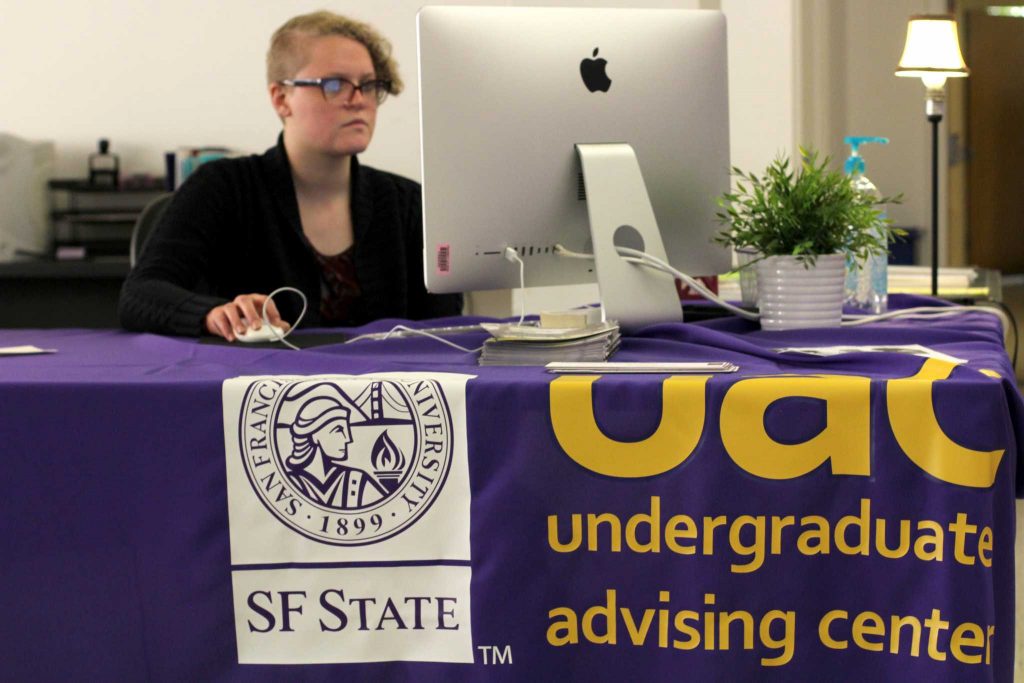After hitting multiple roadblocks when trying to meet graduation requirements, BECA student Tim Blair was finally able to graduate in Winter 2016 – two years after his original expected graduation date.
“I always had issues with classes,” Blair said, noting the time blocks of classes was also a problem as many necessary classes seemed to overlap with each other.
Though Blair has graduated, he said he has yet to receive a degree from SF State.
“I don’t have any word on it,” Blair said. “People who I have talked to haven’t had any real answers.”
SF State students like Blair have experienced similar roadblocks when it comes to completing graduation requirements.
This spring, SF State’s Undergraduate Advising Center implemented new strategies in order to diminish roadblocks to graduation and success for students like Blair.
Kim Altura, associate dean of undergraduate education, said the center commonly sees an issue of students failing to meet the 120-unit graduation requirement.
“At times we also see students missing other general education and University requirements, such as US History or upper division GE,” Altura said.
The center’s goal was to strategically outreach to students with 90 units or more in order to create clear paths to graduation, according to a UAC webpage.
“This goal was chosen specifically because we recognized the need to support high-unit students in planning for their degree completion,” Altura said.
Altura said that the center has emailed and called thousands of students this semester in order to encourage adviser meetings for general education.
“We meet one-on-one and in groups to assist high unit students and those close to graduating in mapping out a pathway to completing all necessary requirements,” Altura said. “We also refer to major advisors so that students can be sure that all areas of their degree are complete.”
Blair said that though he had success with his advisers for his major, when it came to general education advising, he thought that advisers could give more tips to students– such as when certain classes would be offered– and help students produce long-term plans “instead of just saying ‘looks good to me’.”
“My experience as a whole wasn’t bad,” Blair said. “But help with planning, more class sections and fewer prerequisite classes would have made the whole experience a lot better.”
In regards to advisers overlooking graduation documents, students should be looking toward their Degree Progress Report (DPR) on their student center in order to monitor the progress of their academic career, according to Altura.
“The Graduation Application outlines resources for students,” Altura said. “And (it) suggests that they check their DPR and meet with an advisor in the Undergraduate Advising Center to be sure that they are done with all their requirements – major, GE and University – before applying.”
Hugo Enriquez-Vasquez, a senior Latinx studies major, said he will be walking for graduation this spring despite having to take a GWAR class in the fall in order to complete his degree since the class was not offered over the summer.
“Now I have to wait, and I don’t exactly have the money to be just taking one class,” Enriquez-Vasquez said.
In regards to the lack of classes, Altura said over 200 additional sections of courses were added this spring in order to meet demand from students. The University is also observing how quickly classes for the fall fill up and will work to add more sections if needed, according to Altura.
“We want to be able to offer the courses students need to progress and graduate in a timely manner,” Altura said.
Graduation rates at SF State have improved over the last several years. The 6-year graduation rate for the 2005 freshman class was 46.5 percent while the 6-year rate for the freshman class of 2009 was 51.2 percent, according to Altura.
“It appears that the number of students who applied for graduation is up from last year,” Altura said. “However, it is far more likely that our work will show an impact if it is sustained beyond this semester.”
Altura said that the University plans to increase the graduation rate to 69 percent by 2025.
“Strengthening campus advising and hiring additional advisors is one part of our long-term campus plan to support student success and graduation,” Altura said. “A strong advising system is shown to have a positive impact.”







